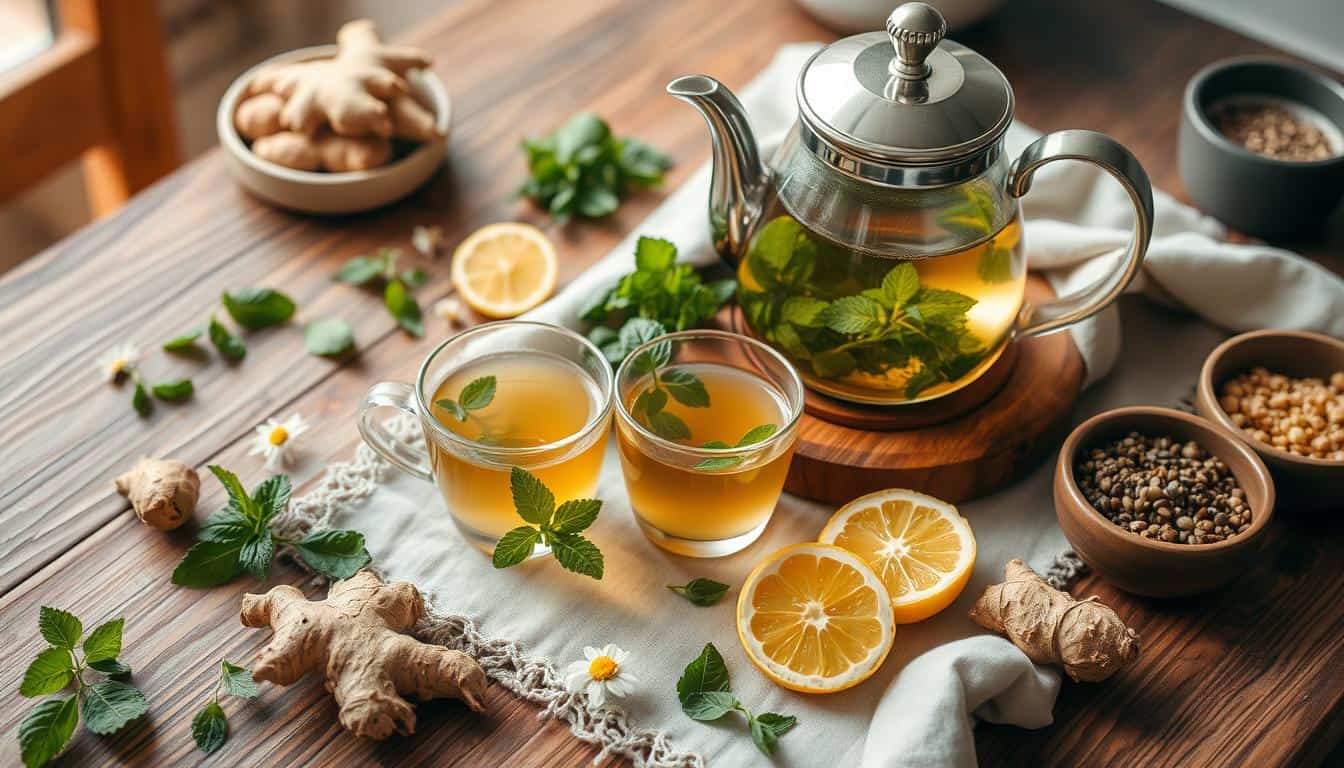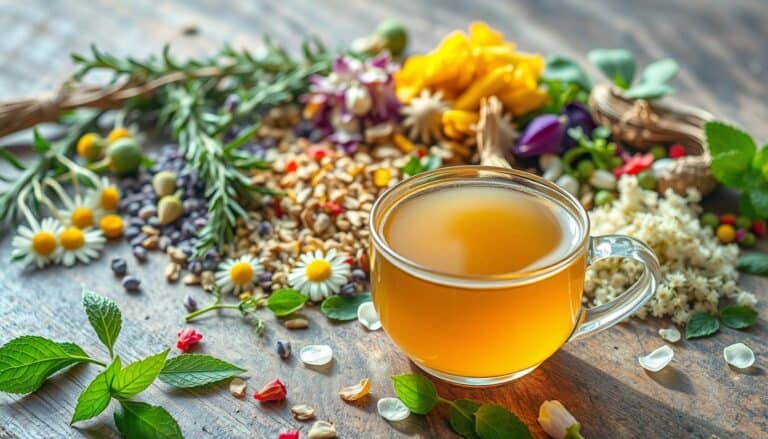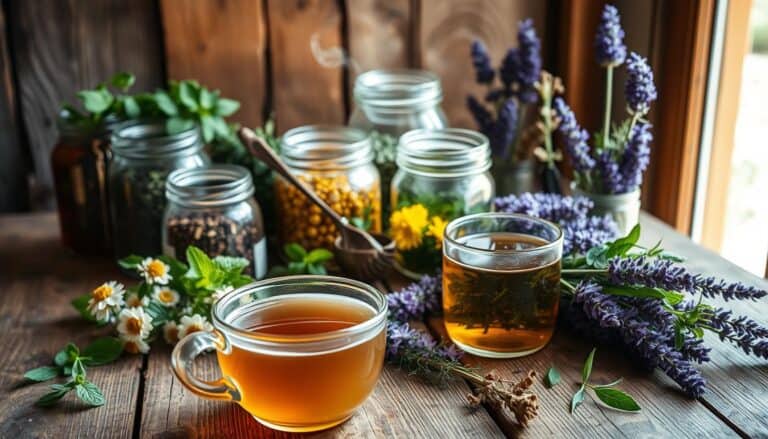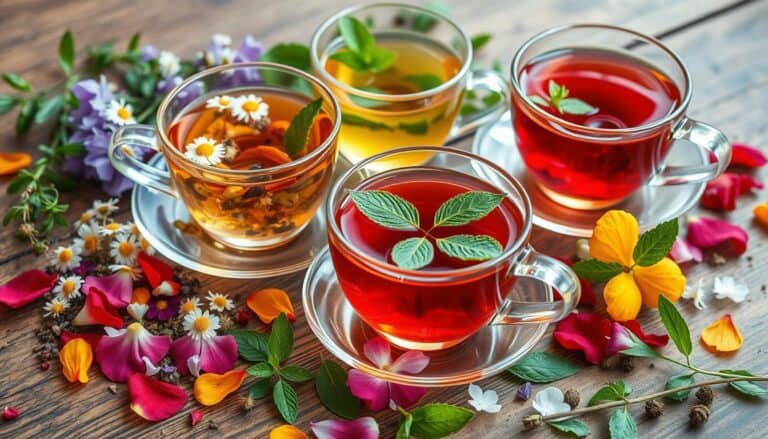9 Herbal Tea Recipes for Natural Headache Relief
This post may contain affiliate links which means I may receive a commission for purchases made through links at no extra cost to you. I only recommend products I truly believe in. Thank you for your support!
Headaches can really mess up your day. But, herbal tea remedies might just be the answer you’re looking for. Our guide covers nine herbal tea recipes that can help with migraines and other types of headaches.
For centuries, herbal teas have been a go-to for natural headache relief. They offer a gentle yet effective way to ease pain. Ingredients like peppermint and ginger have unique healing powers that can help without the need for harsh chemicals.
Studies have shown that some herbal ingredients are really effective. A 2014 study found ginger powder to be almost as good as prescription migraine meds. The National Institutes of Health also backs up peppermint’s ability to ease tension headaches. This guide will help you find the perfect herbal tea for your needs.
Understanding Headaches: Causes and Symptoms
Headaches are complex neurological experiences that affect millions of Americans daily. Understanding these painful conditions can help you find effective remedies and cures.
Our bodies communicate through pain, and headaches are a critical signal that something needs attention. Recognizing the underlying causes can be the first step toward finding migraine relief and implementing targeted treatment strategies.
Common Types of Headaches
Headaches manifest in various forms, each with unique characteristics:
- Tension Headaches: Characterized by dull, band-like pressure around the head
- Migraines: Intense, throbbing pain often accompanied by sensitivity to light and sound
- Cluster Headaches: Severe, periodic pain concentrated around one eye
- Sinus Headaches: Pain related to sinus inflammation and congestion
Identifying Triggers
Understanding your personal headache triggers is crucial for effective management. Common triggers include:
| Trigger Category | Specific Triggers |
|---|---|
| Lifestyle Factors | Stress, lack of sleep, dehydration |
| Dietary Influences | Caffeine, alcohol, processed foods |
| Environmental | Bright lights, loud noises, weather changes |
Importance of Herbal Remedies
Natural headache cures offer a gentler approach to pain management. Herbal remedies can address underlying causes like inflammation and muscle tension with fewer side effects compared to conventional medications.
By understanding your unique headache patterns and exploring holistic approaches, you can develop a personalized strategy for finding lasting migraine relief and tension headache remedies.
Benefits of Herbal Tea for Headache Relief
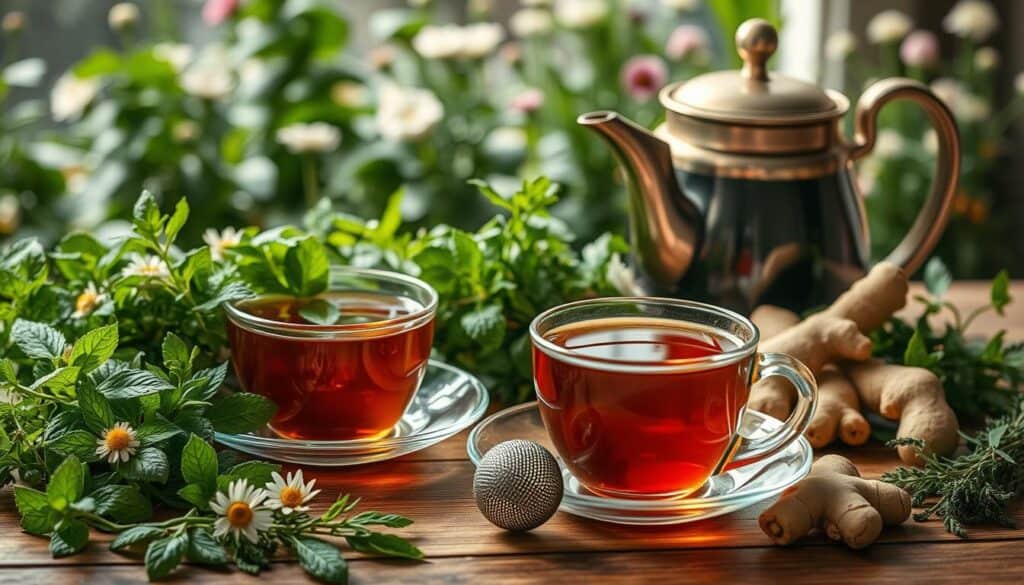
Natural herbal teas are a gentle way to fight headache pain. They are caffeine-free and offer many health benefits. These teas can help ease discomfort and improve your overall well-being.
Natural Ingredients with Healing Power
Anti-inflammatory herbs are key in fighting headaches. Each herbal tea has its own healing powers:
- Ginger tea cuts down inflammation with gingerol compounds
- Peppermint tea eases pain with menthol
- Chamomile tea has apigenin, calming the brain
Hydration’s Critical Role
Drinking enough water is vital to prevent headaches. Herbal teas help with this while adding extra health perks. A 2014 study found ginger tea works as well as some migraine meds.
Stress Reduction Properties
Many herbal teas are great at reducing stress. Ingredients like lavender and valerian help relax the mind. This can lower the chance of tension headaches.
Adding these natural, caffeine-free teas to your routine can help manage headaches. It’s a natural way to support your health.
Chamomile Tea: A Soothing Remedy
Many people look for natural ways to ease tension and stress headaches. Chamomile tea is a gentle yet effective solution. It helps manage pain and promotes relaxation naturally.
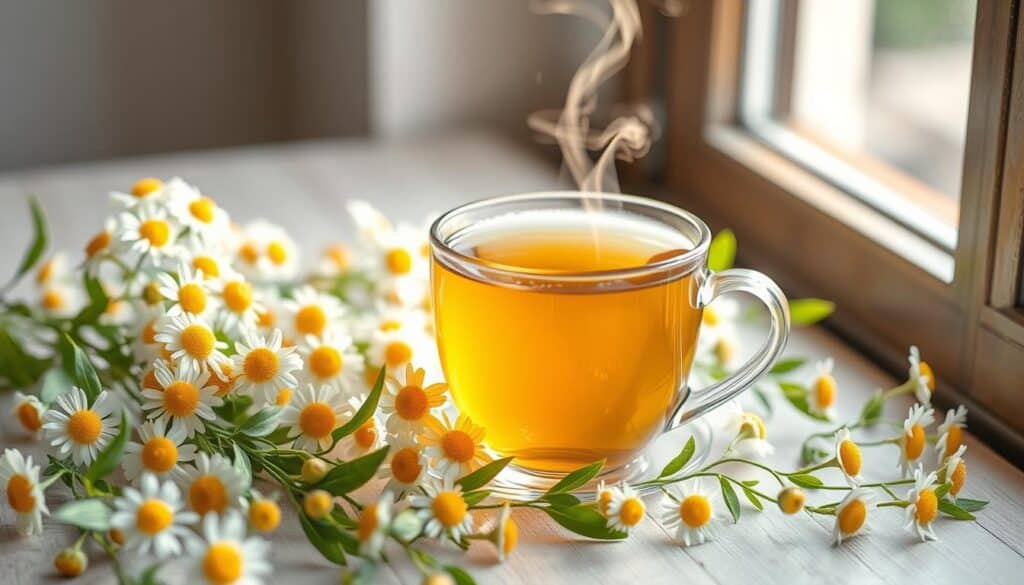
Chamomile tea is known for its healing properties. The flowers in the tea have compounds that calm the nervous system.
Preparation Method
To make the perfect chamomile tea, follow these steps:
- Select high-quality dried chamomile flowers
- Use 2 teaspoons of flowers per cup of water
- Bring water to a gentle simmer
- Steep for 5-10 minutes
- Strain and enjoy warm
Benefits for Headache Relief
Studies show chamomile tea helps with headaches. It can reduce anxiety and stress, common headache causes.
| Benefit | Research Finding |
|---|---|
| Stress Reduction | Shown to lower cortisol levels in anxiety patients |
| Pain Management | Contains anti-inflammatory properties |
| Relaxation | More effective than placebo in reducing anxiety |
For those looking for natural headache cures, chamomile tea is a good choice. It’s a gentle, holistic way to manage tension headaches without drugs.
Experts suggest drinking chamomile tea 2-3 times a day when a headache starts. It’s safe for most people, including pregnant women and kids, making it a versatile pain relief option.
Peppermint Tea: Refreshing and Invigorating
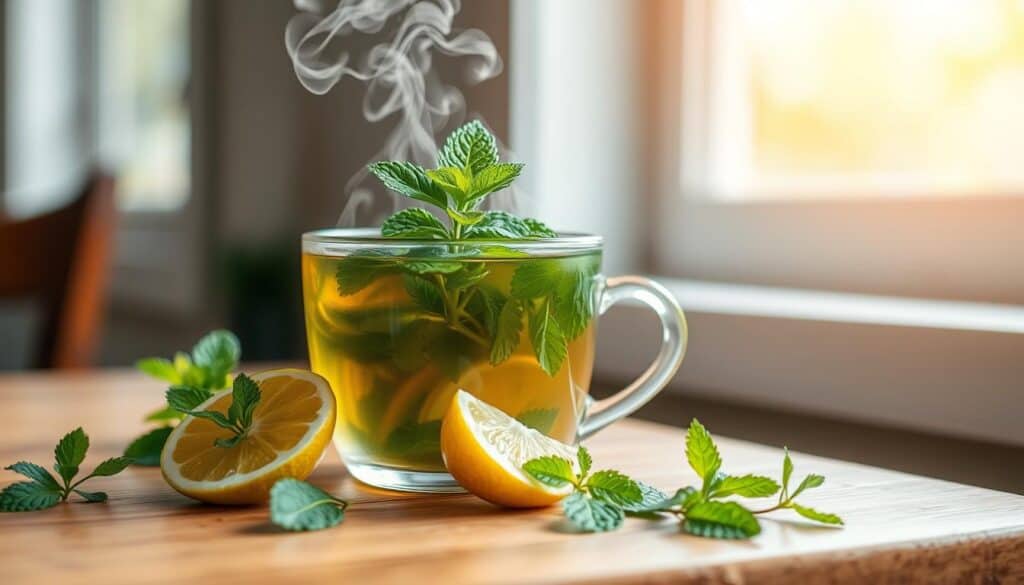
Peppermint tea is a strong natural remedy for headaches. It tastes great and has amazing health benefits. It’s perfect for those looking for ways to ease tension headaches.
Peppermint tea’s secret is its special ingredient, menthol. Menthol helps in many ways:
- Relaxing muscle tension
- Improving blood circulation
- Reducing pain sensations
- Calming nervous system responses
Brewing the Perfect Cup
To make the best peppermint tea, follow these steps:
- Use 2 teaspoons of fresh or dried peppermint leaves
- Pour 150 ml of boiling water over the leaves
- Steep for 5-7 minutes
- Strain and enjoy warm
Alleviating Tension Effectively
Studies show peppermint tea is great for tension headaches. It relaxes muscles and calms the nervous system. Clinical studies suggest that menthol can significantly reduce headache intensity, making it a valuable natural remedy.
Drink peppermint tea 2-3 times a day for best results. But, if you have health issues, talk to a doctor first.
Ginger Tea: A Powerful Anti-inflammatory
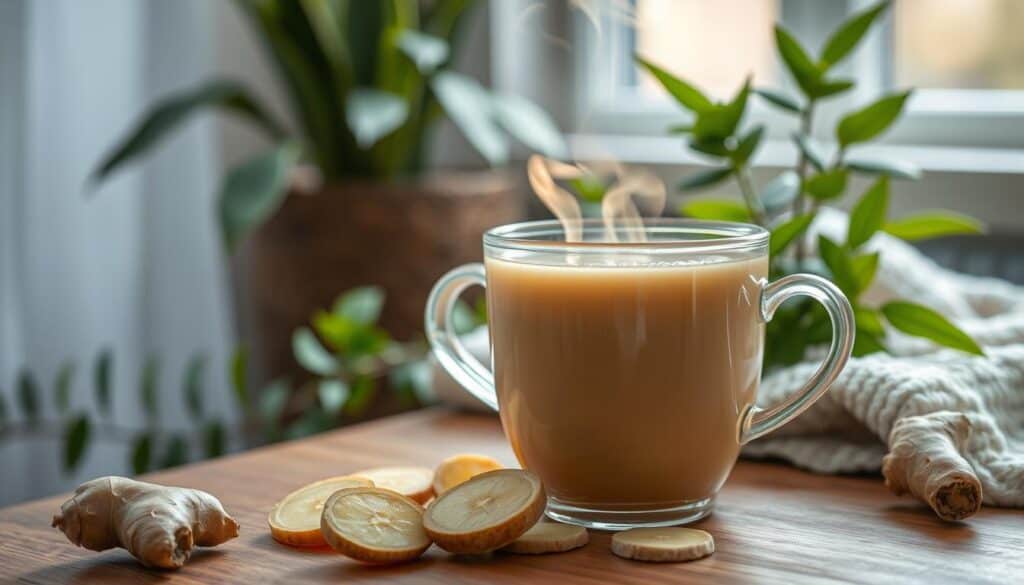
Ginger tea is a natural remedy that has been loved for thousands of years. It’s a strong anti-inflammatory herb that helps with migraine relief. It’s a great choice for those looking for natural ways to feel better.
Ginger tea is known for its health benefits. Studies show it’s great for headaches. A 2018 study found ginger extract works as well as some medicines for migraines.
Preparing Your Healing Brew
Making the perfect ginger tea is easy. Just follow these steps:
- Select fresh ginger root
- Wash and chop about 1 cm of ginger
- Boil in 1 liter of water for 5-10 minutes
- Strain and enjoy hot or cold
Additional Health Benefits
Ginger tea does more than just help with migraines. It also:
- Reduces inflammation
- Supports digestive health
- Boosts immune system
- Helps manage nausea
Experts say drinking up to 4 cups a day is best. They suggest a 550 mg capsule at the first headache sign. Always talk to a healthcare professional before trying new supplements.
Ginger tea has a long history in Asian, Indian, and African traditions. It’s a powerful natural remedy for overall wellness.
Lavender Tea: Aromatic Calm
Lavender tea is a natural cure for headaches, offering a calming escape from stress. It has a long history in medieval Europe, valued for its healing powers.
Lavender tea is special because it helps reduce stress in many ways. It comes from the Lavandula angustifolia plant, making it a top choice for natural headache relief.
Brewing Techniques for Perfect Lavender Tea
To make the perfect lavender tea, you need to be careful. Here’s how to do it:
- Use 1 tablespoon of dried lavender per cup of water
- Steep in boiling water for 5-10 minutes
- Strain and enjoy warm or chilled
- Add honey for enhanced flavor if desired
Stress Reduction and Healing Properties
Lavender tea is great for easing tension and headaches. Its natural ingredients help calm the nervous system and encourage relaxation.
| Benefit | Impact |
|---|---|
| Muscle Tension Relief | Helps relax tight muscles |
| Stress Management | Reduces anxiety and promotes calmness |
| Headache Alleviation | Supports natural pain reduction |
Even though lavender tea has many benefits, it’s important to talk to a doctor before using it a lot. Pregnant women, kids, and people with certain health issues should be careful.
Lavender’s scent is not just for tea. It also helps through aromatherapy and essential oils. With thirty-nine known species, lavender is still a topic of interest for many.
Feverfew Tea: Traditional Pain Relief
Feverfew tea is a strong herbal remedy for migraines, with a long history of healing. It has caught the eye of researchers and health fans looking for natural ways to fight chronic headaches.
Historical Medicinal Significance
For ages, ancient healers saw feverfew’s power to help with many health issues. It has been used for:
- Migraine prevention
- Inflammation reduction
- Pain management
- Fever treatment
Scientific Research and Effectiveness
Studies have shown feverfew tea’s ability to help with migraines. Key findings include:
| Study Details | Findings |
|---|---|
| 3-Month Study (49 Participants) | 50% decrease in migraine frequency |
| Combined Feverfew Studies | Slight improvement over placebo |
| Dosage Recommendation | 50-100 mg daily |
Potential Side Effects and Considerations
While feverfew tea shows promise, it’s crucial to know a few things:
- Avoid during pregnancy and breastfeeding
- Potential interactions with anticoagulants
- Possible minor side effects
- Consult healthcare professionals before regular use
To make feverfew tea, steep 15g of the plant in 600 mL hot water for 10 minutes. Drink up to three cups a day for migraine relief.
Remember, everyone reacts differently to herbal teas. Always use caution and get advice from a healthcare expert.
Combining Herbs: Unique Tea Blends
Making your own herbal tea blends is a great way to feel better naturally. By mixing different herbs, you can create teas that help with pain and inflammation. This approach offers a full-body wellness solution.
Herbal teas are a new way to ease headache pain. A mix of peppermint and ginger is very effective. It relaxes muscles and cuts down on swelling. This tea is perfect for those who want to avoid medicines.
Chamomile and lavender are another great pair for stress headaches. They work together to calm you down and ease tension. To make the most of these teas, use two to three teaspoons of herbs per cup. Steep for 10-15 minutes to get the best benefits.
Recipe 1: Peppermint and Ginger Fusion
For this blend, mix equal parts of fresh peppermint and grated ginger. It’s great for headaches and has anti-inflammatory effects. This helps reduce pain and boosts your overall health.
Recipe 2: Chamomile and Lavender Harmony
Combine one teaspoon of chamomile flowers with one teaspoon of lavender buds. This tea helps with stress and might ease tension headaches. It also smells wonderful.
Health Benefits of Blending Herbs
Trying out herbal tea blends lets you tailor your wellness plan. Store them in airtight containers for up to six months. This makes them a cost-effective and eco-friendly choice. Always talk to a doctor before adding new herbs to your routine.
